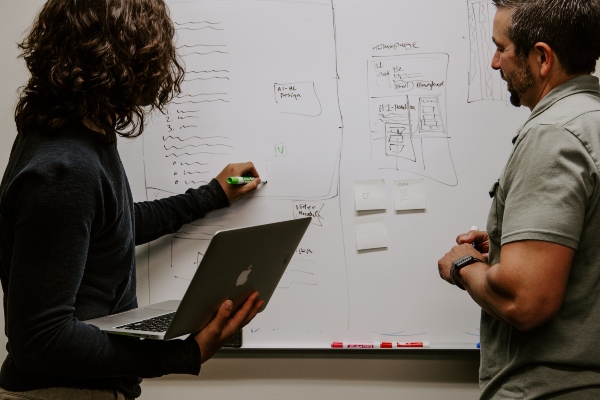Why are Research and Development Important?
R&D Innovation During Economic Challenges


R&D Innovation During Economic Challenges
Research and development, or R&D, is an essential part of the creation or improvement of products and services across a wide range of industries. In engineering sectors, R&D is often the first stage of a project and a career area that presents a lot of opportunities for candidates to utilise lateral thinking skills and get involved in developing exciting new ideas.
Fuelling innovation through research and development requires investment however, and we’re living in a time when this kind of funding is becoming less easily available to businesses that need it. The work is still incredibly important, but economic uncertainty means that any investment requires a lot more certainty than it may have done before.
Companies and engineering candidates involved in R&D may be wondering how this area of the industry is going to develop in light of a potential UK recession and what this might mean for job prospects or investment opportunities. In this article, we explore why research and development are still so important for innovation, and discuss how they might be impacted by current and future financial challenges.
Research and development projects are beneficial no matter what industry they’re taking place in. In engineering, R&D is used to gather data, highlight risks, run preliminary tests and conduct feasibility studies, as well as support product development and help to ensure the safety and quality of project deliverables.
A key benefit of R&D is that it leads to the creation of new and innovative products and services. This is a massive benefit to individual businesses, giving them a competitive advantage in the market and providing them with a previously untouched customer base to market their products.
R&D is a very valuable investment for a company, as the findings of research and development processes help to refine products and systems and highlight potential issues before a project is completed. Not only will R&D help to reduce project costs in the long run, but you’ll likely benefit from the data you’ve collected or ideas you’re uncovered long after the work has been done.
For small businesses in particular, a benefit of research and development is that there is a range of funding options available for R&D projects which makes it easier for you to get ideas off the ground. If a project is working towards an innovative product or solution, you’re also more likely to gain the interest of investors and venture capitalists that may also financially back your business.

Along with the benefits of R&D on innovation, it can also be a really useful method of improving and refining existing processes and products. This can increase efficiency and reduce internal costs, allowing more of your resources to be spent on pursuing new ideas and sources of income.
The innovation brought about by research and development also benefits the wider engineering industry, as new discoveries and ideas influence other companies and can transform more products or processes as a knock-on effect. It also benefits the industry by presenting opportunities for collaboration and learning from one another, forging partnerships that allow everyone involved to benefit.
The partnerships created by R&D opportunities can also be a useful way for smaller businesses to improve their reputation through associating with a trusted partner or institution, you’ll gain more recognition through this association and may also gain additional, useful business contacts.
Finally, successful and innovative research and development can provide benefits to a company’s recruitment efforts. High-quality candidates tend to be more attracted to organisations that are leading the way in terms of industry innovation, and R&D is one of the key ways that you can facilitate this.
Research and development facilitate innovation because they provide the necessary data and insight to launch new products and services. At the beginning of any innovative project, there’s an R&D team conducting the necessary research and tests that the rest of the work will use as a foundation until the project is complete. Without this research, plenty of projects wouldn’t have the necessary direction and focus to succeed.
New ideas can also be trialled and modelled through research and development instead of a team taking a gamble that an idea will work and running with it without any proper testing. This can save a lot of money and make it easy to highlight issues or potential setbacks right at the start of the project, minimising wasted costs and delays.
R&D is also an important component of innovation because it is often what uncovers a concept or data point that is then developed into a new, innovative idea. Researchers might have been looking for something completely different to begin with, but in pursuing a hypothesis or seeking evidence to back up an idea, there are plenty of instances where the seeds for more innovation may be sown.
There’s evidence that investment in research and development makes it more likely that a company’s output is going to be innovative. This won’t always be the case, but the clear link between R&D and innovation suggests that the latter is almost always a product of the former.

Now we’ve looked at the benefits of R&D and how it links to innovation, how does this relate to the current state of the engineering industry and the impact that the economy is currently having on research and development?
The UK is not officially in a recession under the technical definition of the term, but many banks and financial advisors have started to use the word to describe the country’s current economic state. We are also facing a significant cost of living crisis that is placing a lot of financial pressure on companies and individuals, reducing the likelihood that a lot of money will be invested in research and development projects in the near future.
Investors are much more hesitant to support new projects and start-ups when the state of the economy is so uncertain, but the research and development industry has already been seeing a decrease in funds for several years, spurred on by the effects of the COVID-19 pandemic. It might seem as though the future of R&D will be bleak whilst we ride this wave of financial difficulty, but it’s worth noting that innovation is often born out of challenging situations like this.
If we look at the impact of coronavirus for example, a study by McKinsey found that three-quarters of executives from over 200 organisations agreed that this crisis led to new opportunities for growth. Whilst only medical and pharmaceutical companies dedicated time and resources to innovation during this period, almost every industry has been changed by the effect of national lockdowns and changing attitudes to work, health and travel, demonstrating how this challenging period of time led to plenty of innovative ideas.
Another study looking at the impact of the Great Depression on US innovation identified that, whilst this major period of financial hardship reduced the number of new ideas and products coming from independent creators and businesses, innovation remained relatively steady from larger companies. This is thought to be because investors feel more secure supporting established organisations during economic difficulties, so innovation is still facilitated by these businesses.
A recession or extended period of financial difficulty is a stressful time for businesses, but it’s important to remember that a crisis can often be a catalyst for innovation. When external events force you to reevaluate your priorities or present new challenges that require urgent solutions, you’ll likely have to think outside the box to overcome these situations and can use this to your advantage.
Situations like a cost of living crisis and a recession also mean that your customer’s priorities are likely to change, which again creates opportunities for innovative ideas that respond to these new needs and challenges. There will be a demand for more cost-effective products and services or methods of managing money more effectively, creating problems that businesses and R&D projects can solve.

If you’re part of a company considering a new research and development project or line of enquiry, it’s understandable to be worried about the stability of this investment. Not only could you be concerned about a lack of funding to complete necessary research, but you may also be preparing for the fact that your usual target audience may not be as inclined to purchase a new product or service because of their own financial struggles.
It’s wise to be wary about large investments at a time when the economy feels unstable, but companies shouldn’t abandon their investment in R&D altogether. As we’ve already highlighted, there’s a lot of potential for successful innovation during times of economic crisis, and businesses should look for opportunities because of this. Technological innovation, especially in electronics and embedded systems engineering, is happening rapidly at the moment, and this progress should still be pursued.
Of course, companies should take more time to properly assess their spending when it comes to research and development at the moment, as it’s incredibly important to ensure that you’re using your budget efficiently and aren’t going to be left in a difficult financial situation later on. Innovation should be pursued when you are certain that there’s a market for it, otherwise you may end up with a product that isn’t going to make it on the current market.
You should also be prepared for fewer funding opportunities to support your research and development efforts. Competition for remaining funding is also likely to be fiercer, so be prepared to have to fight for additional support and put together incredibly convincing proposals for the R&D work you’d like to complete.
From a candidate’s perspective, research and development in the engineering industry isn’t a sector that you should shy away from when it comes to looking for a new role. It’s not a position that is in excessively high demand, but it will continue to see a steady stream of opportunities across a range of engineering disciplines.
As we’ve explained above, R&D is an area that may feel the impact of financial struggle and see a lot less funding and interest than it has in previous years, especially as part of smaller companies and start-ups. However, R&D roles in large corporations are likely to remain and will be requiring candidates that have the necessary skills to conduct research to support innovative projects.
There’s a lot of potential for innovation in research and development, so if you’re a candidate looking for opportunities to support the development of new products and services, there will be important work to be done in the coming years. It’s wise to stay informed about how the country’s economic state may impact this sector, but at this stage, there’s no reason to believe that R&D candidates will be too badly impacted.

Research and development in the electronics and embedded systems engineering sectors have a lot of potential for innovation, particularly when looking at the applications of Internet of Things technology. Clients and candidates in this area should stay aware of the changes in this sector in light of the UK’s financial challenges, but should also remember that these moments in time can often be the perfect opportunity for new developments to make a real difference.
If you’re an employer in the embedded systems or electronics industry looking for recruitment support in the coming months, KO2 is a specialist agency that can help develop a successful strategy. Equally, we have a range of job opportunities for candidates in these sectors that are ideal for those wanting to work in research and development. Get in touch to speak to our team and find out more about the services we offer.

 Are CVs Irrelevant? Why Do You Need a CV in the Engineering Industry?
Are CVs Irrelevant? Why Do You Need a CV in the Engineering Industry?